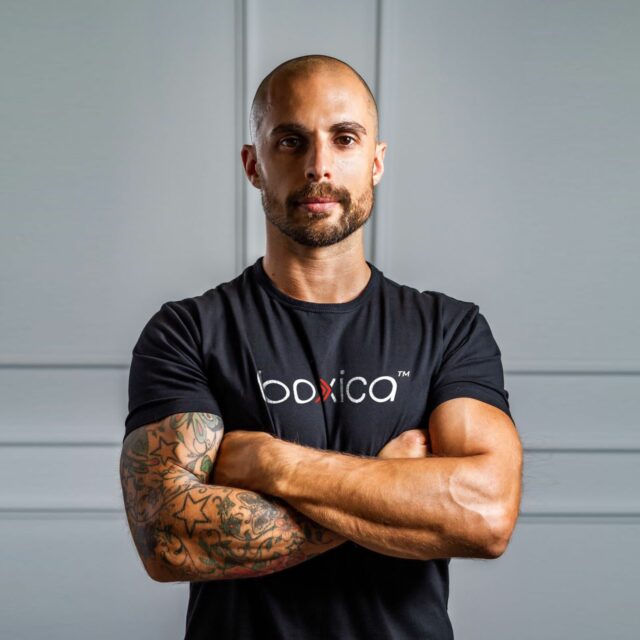Mohammad Al Shehhi remembers it as though it were yesterday, the moment he stepped into a wrestling ring and felt as though he finally belonged.
Honing his skills, perfecting his performance and losing himself to a roaring crowd inspired the 28-year-old to turn his hobby into something bigger — facing his mental health demons in the process.
“Behind every Superman is a Clark Kent and behind every cape is vulnerability,” says Al Shehhi, who was diagnosed with ADHD last year.
“In the ring, I get to experience what it’s like to be a superhero, but in my day-to-day life, I’m a man who has struggles like everyone else. Wrestling helps me channel that energy and focus it into something positive.”
Today, he is the first ever Emirati wrestler to represent the UAE overseas and is responsible for the official recognition of the sport in the emirate by the Dubai Sports Council.
In the ring, he is a picture of ferocity as he mercilessly takes down opponents, but the idea of “toxic masculinity” is something he has battled with for most of his life.
“There’s so much stigma surrounding male mental health and the threat it poses to conventional masculinity, especially in this part of the world where toxic masculinity is on steroids,” he says.
“We’re told to be tough, not to cry, to be ‘a man’. Traditionally, men didn’t ask their wives or their moms or their sisters for support, they dealt with everything themselves.”
Since childhood, Al Shehhi lived with the symptoms of ADHD. It was only after his mother expressed concerns last year that he decided to see a psychiatrist, though the diagnosis was just the beginning of his journey.
“It was a relief to finally have an explanation for the way I’d been feeling. Opening up to close family and friends was daunting. Once I did it, I felt like the chains had been broken.”
Starting a conversation about male mental health
Al Shehhi isn’t alone in his early hesitance to speak out. According to a UK study last year, 40 percent of men simply refuse to talk about the topic, with the same number saying it would take suicidal thoughts to make them open up to anyone.

Suicide is the biggest cause of death among men aged 20 to 49 in the UK. The Office for National Statistics found that almost three-quarters of UK suicides last year were male, but the mental health crisis goes far beyond Europe.
The Global Burden of Disease study estimates that mental disorders are just as common in the GCC as they are worldwide, though they tend to be under reported because of a lack of awareness and limited funding in some countries.
In the Gulf region, 15 percent of the population is thought to suffer from mental health problems, with 75 percent suffering in silence. Statistics are hard to come by in the UAE, but according to the World Bank, 8 men per 100,000 committed suicide in 2019, more than double the rate of women.
This doesn’t come as a surprise to Dubai DJ Kris Fade, who speaks openly about his anxiety issues on his Virgin Radio show and on the Netflix reality series Dubai Bling.
“Growing up, we talked about ‘being a man’, which people believe is defined as being strong and keeping things to yourself,” says the father-of-two.
“Growing up as an Arab man and also an Australian man, both of these cultures share those same views. We sometimes feel embarrassed to talk to our male friends about issues that we’re going through. Truth be told, many of us are going through issues and we all remain silent.
“I’m trying to help break the stigma for men to stop hiding their feelings and really start sharing it more with family and friends.”
For Dr Bahjat Balbous, a psychiatrist at Euromed Clinic Dubai, cultural stigma is one of the chief obstacles.
“This is because the stereotypical, alpha-centric way in which men have been portrayed in society has promoted the idea to them that needing help for mental health is a sign of weakness,” he says.
“In most countries, men are brought up believing they have to show strength and composure throughout their existence, no matter what issues or crisis life presents them with.
“This makes it hard for most men to accept when facing mental health challenges, much less seek professional support or intervention.”
Drawing strength from the struggle
For Bader Shahin, the “work hard, play hard” mentality of Dubai resulted in a nervous breakdown at work and a total lifestyle change.
“It was a culmination of two years worth of stress and burnout that suddenly just hit me at the speed of a train,” says the 36-year-old.
“Before I moved to Dubai I’d been through a toxic relationship and struggles at work so I didn’t arrive in the best frame of mind to begin with and felt like I was on a downward spiral.”
Shahin embarked on an intensive therapy program, combining it with Kundalini yoga to achieve a sense of clarity and peace.
But, like Al Shehhi and Fade, the stigma of asking for help as an Arab male was difficult to overcome.
“It’s definitely cultural,” he says. “You’re not expected to express your emotions or speak your mind in a way that makes you feel vulnerable because vulnerability is seen as weakness and a weak man is a useless man.”
Today, Shahin channels his experiences into helping others as a marketing director at Ayadi, an Arabic-speaking online mental health platform, and is encouraging men to break through destructive stereotypes.
“It’s not easy to unlearn all this programming you’ve been fed throughout your life but it’s 10 times harder to live with the burden,” he says.
“Being a free man living a free life brings so much joy rather than complying with archaic belief systems that no longer serve you.”
Move, sweat and feel good
Like Shahin and Al Shehhi, people around the world are feeling the benefits of exercise, whether it be yoga or something faster-paced.
In June last year, the John W Brick Foundation released its Move Your Mental Health Report, which found that 89 percent of participants reported improved mental health as a result of exercise.
In Dubai’s Studio City, the founder of Boxica, Cyrus Rustom, encourages anyone struggling with mental health problems to move their body as a way to quieten the mind.

“I was in the Royal Marine Commandos so I know only too well the pressure that can be put on men to be tough. You push a lot of stuff down and it doesn’t stay down for long,” he says. “By exercising, you feel like you’ve achieved something for yourself. Your brain is releasing endorphins and that natural high will continue for hours after you finish.
“For that 50 minutes you’re not thinking about work or deadlines or other stressors, you’re focused on hitting that bag in front of you, and that lets you feel more centered.
“To anyone suffering in silence I’d say don’t be ashamed. Move, sweat and you will feel better.”
How can I help someone I love?
Often, friends and family members can notice changes in their sons, brothers or husbands, but their pleas can fall on deaf ears.
For Dr Juan van Wyk, a clinical psychologist at Lighthouse Arabia, open conversation is essential.
“Whenever you sense changes in a loved one’s functioning, it would be wise to make them aware of what you have noticed and let them know that you care about their well-being,” he says.
“Ask them specific questions instead of generic, open-ended questions, which are easy to answer in an evasive way.
“Finally, I would recommend leaving the invitation for support if needed. Let them know they don’t need to bear the load of mental health challenges alone.”
Dr. Bahjat Balbous’ five top tips on men’s mental health
Interact with your loved ones: Research has shown that people feel 12 times more likely to feel happy on days that they spend 6-7 hours with friends and family.
Laugh: If you are anxious, try finding something to laugh about. Watch a comedy or hang out with an easy-going friend.
Plan a trip: Having something to look forward to can boost your overall happiness. A change to your routine can also spark more conversations around feelings and mental health.
Get outside: Try to spend at least 30 minutes each day outdoors. Being in nature can increase energy levels, reduce depression and boost well-being.
Eat well: Incorporate some Omega-3 in your diet. These fatty acids are linked to decreased rates of depression and schizophrenia and they help to build healthy gut bacteria.






